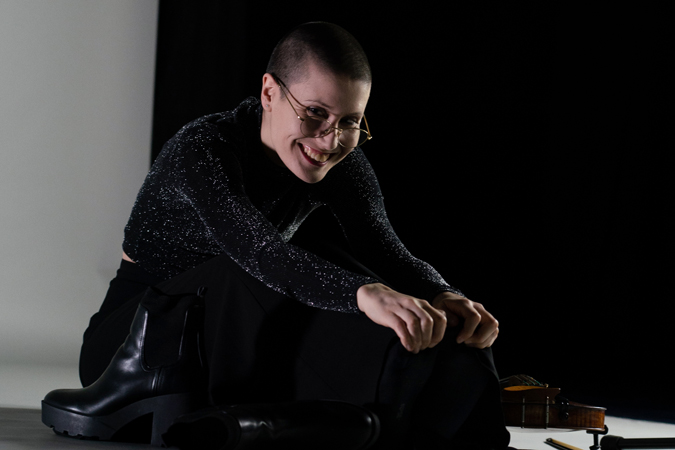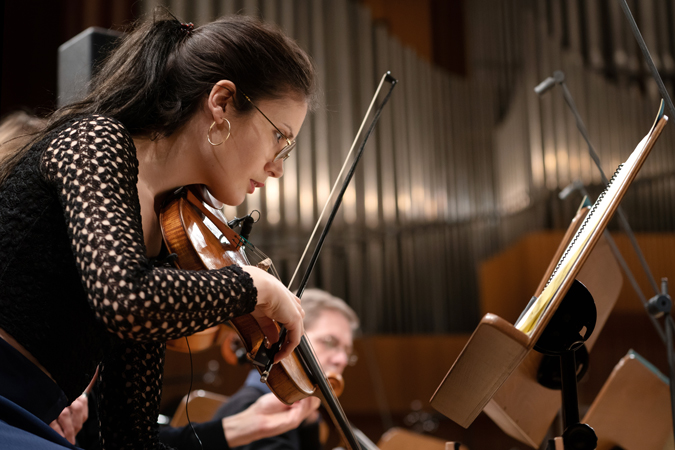26. February 2020
Get to know Sara Cubarsi!
The violinist Sara Cubarsi is the newest member of the Ensemble Musikfabrik. Born in Barcelona in 1991, she studied in London and California and has gained international recognition as a soloist, composer and chamber musician. Although her focus is on contemporary music, she loves to explore a wide variety of styles, and also performs on the baroque and the electric violin. Sara Cubarsi curates her first monday concert on March 2nd, 2020.

Sara, tell us about your main musical influences.
My parents are not musicians, but I grew up listening to different kinds of music and all my three siblings are violinists specializing in different fields. I think the lively environment of musical exchange that I had, and still have, at home is the main characteristic of my musical upbringing. Additionally, I have always been a Jascha Heifetz fan, and there are composers that have directly/personally influenced and guided me, the biggest influence coming from my past composition teacher Wolfgang von Schweinitz. Paradoxically, he had great input in my journey into early music. For many years I followed the work of the Wandelweiser group and the Plainsound community of performers and composers, and in California I surrounded myself by world music and experimental noise metal. All these elements shape my musical taste…
You appear as a performer, composer and visual artist – is there a combining element?
When I was studying in California, these activities were completely interwoven. I was performing my own work, and making wax paintings that melted at the same time as performing. There, I had a lot of time and space for experimentation. I was interested in just intonation and the challenge of perfect equilibrium, both in tuning and in the more tangible world. Wax became a parallel obsession with intonation, probably because of its qualities. Dealing with wax was a bit like dealing with tuning, it shows itself fragile and receptive (or vulnerable) to external changes. I was also interested in the idea of ‘vibrant matter’ (there is a very interesting book by Jane Bennett), and was inspired to think about these entities as having their own relatively unpredictable lives, so the wax paintings kind of choreographed themselves in performance time. I also found the experience of performing microtonal music to stimulate different senses, there is something very sensual in this music. Composing for these paintings had to also allow a certain openness and receptivity to how and when the wax will melt. I enjoyed bringing this conversation with materials outside of music into music.
You also do a lot of baroque music – does it make a difference for you or is it basically the same thing as working on a contemporary piece?
Yes, it’s more or less the same thing… with a slight time displacement. With baroque music, one cannot talk directly to the composer. One wonders how the instruments of those times sounded, how the historical context affects our taste, musical choices and priorities, etc. But this gap is filled by the study of old documents, paintings, surviving instruments, etc., and a little bit of imagination. Of course, these parameters are dealt with more immediacy when learning a piece by a composer who is alive today, but similar questions come up in new music too, especially because every composer presents such a different world today. I think that one of the main differences comes to the surface when looking at notation. One can learn about many of the performance practices in early music through treatises, but not so much through notation, there is so much that is not written in the score, because of a more or less standardized performance practice, at least by regions. But in the field of contemporary music, each composer often develops their own notation style that suits their own particular musical priorities. These priorities change so much more from composer to composer in contemporary music, than when looking at baroque composers. Usually, the tendency of most contemporary composers that I play is to try to reflect in the score how it should sound or be executed as accurately as possible, because of this variety in styles and performance practices in new music today – and usually the score comes preceded by the performance notes, which would be like the miniature equivalent to an early music treatise. There is also the question of purpose and function as performers – it doesn’t feel as heavy when playing new music as when looking back 300 years and deciding to play that music today … So perhaps it is not basically the same in the end?
Why focus on contemporary music?
For me, my involvement with new music happened naturally, I used to hang out with the composers at college – and I compose a bit myself. But this is a strange question. I try not to leave for tomorrow what I could do today, and with music, for me, this means not leaving it up to your friend’s grandchildren to figure out how our contemporaries imagine their music to sound (although, if we could spy from our grave, that would also be very interesting).

As member of Ensemble Musikfabrik what do you wish to achieve for yourself and for the group?
I learn a lot from working with these amazing musicians. They have a lot of experience and have been working together for a very long time – one can feel a high level of trust, comfort, and knowledge of each other, it’s a healthy vibe. This long-term ensemble situation is a special opportunity, and still a new experience for me, that allows going into more musical detail than when you are constantly meeting and playing with new people in the freelance scene. One also brings their own musical influences into the ensemble, and gets to know others’ interests. Also, I think it’s important for the ensemble to have performers from younger generations and from a variety of countries, each of us being a direct connection to a different generation of composers and views.